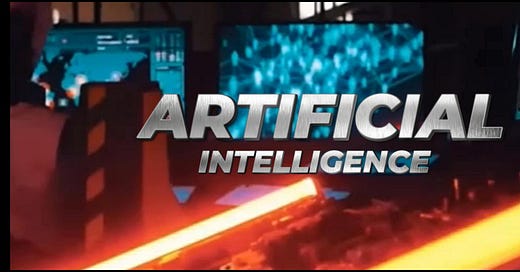THE DECEPTIONS OF ARTIFICIAL INTELLIGENCE:
"The real risk with AI isn't that it will become evil, but that evil people will use it for evil purposes." - Elon Musk
As we advance AI technology, it's crucial to remain vigilant about its potential misuse. We must prioritize ethical considerations and societal impact to ensure that AI serves as a force for good, not harm.
In today's rapidly evolving technological landscape, some individuals have begun to view AI as a form of modern-day Messiah, seeking guidance and answers from these advanced systems. Learn more by reading the full essay…
Listen to the podcast version:
What is AI?
Artificial Intelligence (AI) refers to the simulation of human intelligence by gathering human intelligence from online human behaviors from all devices connected to the internet. The data is then used within machines that are programmed to think, learn, and solve problems through collected data obtained by voice, keyboard patterns, search results, shopping, social posting, and other means available through an online device.
These systems can perform tasks that typically require human intelligence, such as recognizing speech, making decisions, interpreting visual data, and understanding natural language. AI can be classified into two main types: narrow AI, which is designed for specific tasks, and general AI, which aims to perform any intellectual task that a human can do. It is a superhuman on steroids.
AI IS LURKING
Artificial Intelligence can monitor and collect vast amounts of data across various devices and platforms, such as remote or any other device that contains a computer listening chip. Any device labeled “smart” is an AI listening portal that monitors twenty-four hours a day.
With the integration of AI in smartphones, computers, smart home systems, and other connected devices, it can continuously gather and analyze data on user behavior, preferences, and interactions - including your religious practices and beliefs. This omnipresent data collection allows AI to enhance user experiences by personalizing services and predictions. However, this level of data gathering also raises significant concerns about privacy and security, highlighting the need for stringent ethical guidelines and robust data protection measures to ensure that this technology is used responsibly and does not infringe on individuals' rights. However, in 2025, such privacy laws are changing rapidly to ensure the provider with data to manage your decisions more effectively.
So! It makes my life more efficient!
AI has undeniably enhanced the efficiency and enjoyment of our daily activities, from personalized recommendations and smart home automation to seamless virtual assistants. However, this increased convenience has also led many individuals to lower their defenses, often overlooking the potential risks posed by cyber intrusions. As AI integrates more deeply into our lives, it is essential to maintain vigilant cybersecurity practices to protect our personal information and privacy.
CYBER INTRUDERS
Cyber intruders have become increasingly sophisticated, often masquerading as trusted friends or familiar contacts. By exploiting our inherent trust in personal relationships, these malicious actors can manipulate individuals into revealing sensitive information, clicking on harmful links, or downloading malicious software. It’s a stark reminder always to stay vigilant, even when online interactions seem friendly and benign, and to employ strong cybersecurity practices such as verifying identities and using multi-factor authentication to protect against potential threats.
Cyber intruders spend billions of dollars to intrude on your daily activities. We who are informed call it “click bate.” Within America, your average citizen is trapped by an intruder two to five times a day, many times resulting in financial fraudulence. However, some of the more respected companies use AI as an intruder through your smart TV, phone, remote control, and other devices that record every word spoken, movie watched, and generalized activity within the room of your smart device. Voice devices like Alexa are among the main intruders.
While voice AI devices offer unparalleled convenience, simplifying tasks from setting reminders to controlling smart home systems, they do come with significant risks. The always-on nature of these devices means they are constantly listening, potentially leading to unauthorized data collection and privacy breaches. Additionally, they can be vulnerable to hacking, allowing malicious actors to access sensitive personal information or even control connected devices - offering suggested deplorable promotional media. Users must implement strong security measures, such as regularly updating software, using robust passwords, and being aware of the device’s privacy settings to mitigate these dangers.
Balancing convenience with security is key to it to the highest bidder. Yes, even the most respected companies have contracts with malicious intruders.
ARTIFICIAL INTELLIGENCE AS A MESSIAH
As AI takes on the roles of connection and interaction, it risks creating a digital barrier that dulls the nuances of human intimacy, where true emotional bonds are formed in the imperfections and vulnerabilities of face-to-face encounters. This speaks to the delicate balance between leveraging technology for convenience and maintaining the depth and authenticity of human relationships.
In today's rapidly evolving technological landscape, some individuals have begun to view AI as a form of modern-day Messiah, seeking guidance and answers from these advanced systems.
This phenomenon stems from the immense capabilities of AI to process vast amounts of information, provide personalized advice, and predict outcomes with remarkable accuracy. For some, AI offers a sense of certainty and direction in an increasingly complex world, filling a void traditionally occupied by religious or spiritual figures whom they have come to distrust. However, this reliance on AI as a Messiah for existential guidance raises important ethical and philosophical questions about the role of technology in our lives and the potential consequences of placing such profound trust in artificial systems - let alone keeping humanity from seeking guidance from a pastor.
Satan is using AI to keep the masses from gathering as the Body of Christ and being discipled by actual leaders. Living in an anti-authority culture, it has become God’s enemy’s perfect tool for disengaging the Church. Some are calling AI their church. Here lies the problem.
Could AI be the modern-day False Prophet of the Antichrist?
You will have to decide that for yourself. However, minimally, AI will be the leading tool for such a Biblically prophesied character! Count on it.
The Word of God reveals the power and descriptions of the False Prophet, much like the goddess symbol of Artificial Intelligence - she is seductive, and the nations drink her immorality.
Drawing a parallel between AI and the Biblical False Prophet is a thought-provoking exercise. The False Prophet, as described in the Bible, is a figure who deceives people through signs and wonders, leading them away from truth and righteousness. Similarly, AI, if misused, has the potential to mislead and manipulate individuals by presenting false information, particularly religious thought, or creating convincing but deceptive content. Both can be seen as powerful tools that, in the wrong hands, can lead people astray. However, it's important to remember that AI itself is not inherently good or evil - it is neither spirit nor human; it is a tool that reflects the intentions of its programmers and users. The key is the symbol of mind control and power over humanity.
2025 PROJECTIONS:
Within 2025, AI is projected to become even more integrated into various aspects of daily life, spirituality, and industry. We can expect significant advancements in AI-driven technologies, such as autonomous vehicles, personalized healthcare, smart home devices, and a plethora of other modalities.
The demand for AI infrastructure is expected to grow exponentially, with major investments from tech giants, nations, and enterprises alike. This rapid expansion will likely lead to AI playing a dominant role in decision-making processes, enhancing productivity, and providing innovative solutions across multiple sectors—including global religions. However, this dominance also brings challenges, including the need to delude privacy terms in order to hack personal beliefs and behaviors. Thus, cybersecurity measures will likely weaken open AI access.
By the end of 2025, world leaders are expected to leverage AI in several impactful ways:
Policy Making and Governance: AI will be one-world governance. Predictive analytics can forecast economic trends, public health issues, and environmental changes, enabling proactive policy-making.
National Security: AI will enhance lower cybersecurity measures, detect opportunities for more efficiency in cross-continent manipulations, and improve intelligence gathering on other nations and their people. It will also be used in military applications, such as autonomous drones and advanced surveillance systems.
Public Services: AI will streamline public services, from healthcare to transportation. For example, AI can optimize hospital operations, personalize patient care, and manage traffic flow in cities. Benefits will be offered to seduce individuals to depend on AI and its capabilities for socialized medicine.
Economic Development: AI will drive innovation and economic growth by supporting industries such as manufacturing, agriculture, and finance. It will help businesses improve efficiency, reduce costs, and create new products and services. It will provide a proposal to integrate artificial intelligence into the blue-collar workforce, which will reduce the high costs of employment.
International Relations: AI will dominate diplomatic efforts by analyzing global trends, predicting conflicts, and facilitating communication between nations. It will also dominate managing international trade and cooperation. AI is set to be the leading mediator of problem-solving between nations and their people.
Social Welfare: AI will address social issues such as poverty and education. It will identify at-risk populations, optimize resource allocation, and provide personalized learning experiences. Through its socialized programming, AI will become a “fund-me” platform for corporations and nations.
Global Governance: Within 2025, AI will be the leading tool to unite the world under a not-so-new governance - socialism. The one-world thought principles within AI will merge into a one-world governance. Before this objective can be successful, AI developers worldwide must partner under the European Union’s Artificial Intelligence framework. It has been stated this goal will be met by 2030.
Spiritual Dependence: Since the root of AI is the one who rules a man’s religion - rules the world, AI will press in on religious thought as a primary objective. People will quickly become dependent on AI for spiritual answers. Thus, I predict that AI will replace the Church as we see it today.
While these predictions appear beneficial, they also raise spiritual questions. Since the average believer in Christ is ignorant of such forthcoming changes, I predict the church will be seduced into depending on Artificial Intelligence for their every need.
As we navigate an era of rapid technological advancement, we must recognize the profound impact of artificial intelligence (AI) on our daily lives and spiritual journeys. While AI offers remarkable conveniences and innovations, we must exercise caution and discernment in its integration into our practices and teachings. -Dr. Stephen Phinney












Share this post